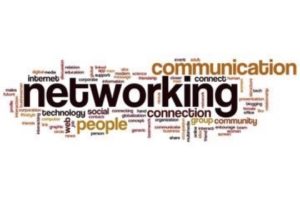Phone, text, email, Twitter – this is how we communicate daily.
You can also throw Facebook, Snapchat, Instagram, TikTok, Pinterest, YouTube and Linked in into the equation.
And sometimes we even talk – gasp – in person.
Communication is natural.
Even before COVID-19 struck, social media platforms had taken on increased meaning in peoples’ lives. So when the pandemic enforced us to self-regulate our in-person contact with others for the sake of our health, we still had options to connect.

I am not downplaying theneed for personal contact – I consider it vital – but thank goodness the online world is providing some alternatives.
And even though communication has “shifted” in terms of execution with all these new variables, one unflappable constant remains:
Connections matter.
And keeping them up can be crucial for your wellbeing.
A 2019 Harvard’s Women’s Health article entitled, “The health benefits of strong relationships” states: “Good connections and social support can improve health and increase longevity.”
The article referred to the commission of a substantial Swedish study involving people aged 75 and over. Those who enjoyed a variety of satisfying contact with friends and relatives were deemeda lower risk for experiencing dementia than those that didn’t.
Obviously, the social aspect of communication and connection is a healthy norm in any community.
But connections – especially in these technologically advanced times – can be developed in different ways.
If we don’t adapt, we perish!
Connections and Business Brands and Management
Brand engagement is all about connection. We share, we recommend and we encourage others to use the brands that we connect with.
And worth-of-mouth is still the most organic and natural form of information we employ, albeit casually: a 2013 brand engagement survey by Gensler reveals that 94% of respondents said they are very likely to recommend their favorite brand to loved ones.

Referralrock.com states that consumers casually discuss specific brands up to 90 times per week, whether over coffee, attending a sports event or even a family picnic.
The level of trust between a person and someone they know is also integral: 88% of consumers place the highest level of reliability from such word-of-mouth recommendations. (https://www.invespcro.com/, 2016)
While research from Nielsen and Edelman shows that barely half of all consumers trust businesses globally, 83 percent of Americans trust recommendations from friends and family. (Jay Baer, convinceandconvert.com)
So, logically, one can conclude that people-trusted brands are endorsed by family, friends, and associates of the consumers that buy – or buy into – them. Some are passionate to the point of evangelism when they believe or pontificate about their latest favourite product or service.
And it gets extremely personal: 51% of them said they are willing to wear a brand’s logo or emblem on their clothing and 29% of the respondents proudly do.
The personal connection between consumers or employees can either make – or break – a brand: a rags-to-riches scenario that can easily reverse into riches-to-rags if the wrong message is communicated.
Reputation is everything: That’s why connecting with your consumers or employees is so important.
True engagement is often more emotional than we realize. Companies may create brands, but it’s people that breathe life into them and sustain them. Connecting to consumers through engagement and communication is key to brand survival and prosperity.
Connections and Mental Health
As much as communication connection is good for business, we mustn’t lose sight of how important it is in terms of maintaining our own health and welfare: physically and mentally.
As our current reality shows no signs of abating in our immediate future, it serves as a good reminder that we need to check in on our loved ones and those around us.
It doesn’t take a rocket scientist to realize how acutely the Pandemic has heightened the severity of loneliness and isolation in 2020. But it also amplifies just how important social interaction was prior to the arrival of COVID-19.
According to research from The Australian & New Zealand Journal of Psychiatry, “Social connectedness was found to be a stronger and more consistent predictor of mental health year-on-year than mental health was of social connectedness.”
“The dominant public health and epidemiological perspective on social connectedness is that it is a resource (a form of capital) that an individual can draw upon in times of need, and which will protect their mental health,” the study suggests.
The underlying message? Being able to convey our feelings and sharing our thoughts to the community will help lighten the burden shouldered by our mental health. Knowing that one is not alone in this fight; that empathy and sympathy are just a conversation, phone call or text message away, creates a healing connection that helps cushion the mental well-being of the one that is struggling.
CONNECTION AND TECHNOLOGY
As the current pandemic persists, physical distancing has been difficult for many who crave connection. We like to be close to the people important to us. We eat together, dance together, drink together. We like doing the things we love with the people around us. But at this time, we are forced to stay away from them for both our sakes. Thus, that craving is drastically increased – especially when it comes to the people who are part of our daily lives.
But the sad truth is evident: for now, we must find other ways to connect.
Stephen Benning, an assistant professor of psychology at the University of Nevada, suggests Skype or other video messaging as a convenient and easy way to see and hear from people who are important to us. An old-fashioned phone call will let you maintain vocal connection, and your favorite social media site’s messaging app will let you keep an individual or group dialog going.
“It is OK to share your anxieties and fears,” Benning counsels. Validating (the fact ) that other people are concerned or even scared can help them feel like they are grounded in reality.”
The term “safety in numbers” has never seemed or felt more appropriate. Whether we wish to build our brand or ensure that our society is coping with the mental anguish that accompanies an unprecedented crisis like a pandemic, connection is the key to hope and survival.
Remember: We are only as safe as our most vulnerable.
